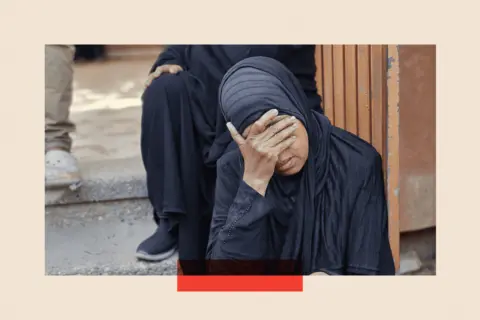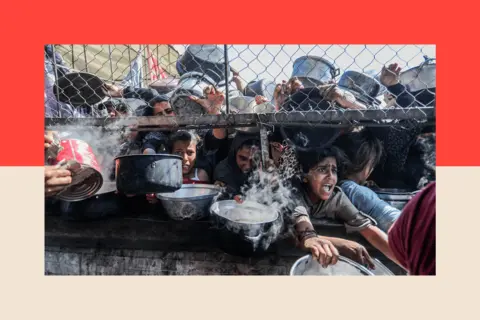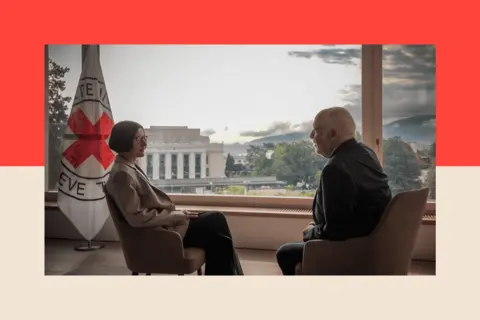The evidence of what is happening in Gaza starts with the numbers. On 7 October 2023 Hamas broke into Israel, killing 1,200 people. More than 800 were Israeli civilians. The others were members of Israel’s security forces, first responders and foreign workers. Around 250 people, including non-Israelis, were dragged back into Gaza as hostages.
Figures vary slightly, but it is believed that 54 hostages remain in Gaza, of whom 31 are believed to be dead.
Collating the huge total of Palestinian casualties inside Gaza is much more difficult. Israel restricts movement inside Gaza and much of the north of the strip cannot be reached.
The latest figures from the ministry of health in Gaza record that Israel killed at least 54,607 Palestinians and wounded 125,341 between the 7 October attacks and 4 June this year. Its figures do not separate civilians from members of Hamas and other armed groups.
According to Unicef, by January this year 14,500 Palestinian children in Gaza had been killed by Israel; 17,000 are separated from their parents or orphaned; and Gaza has the highest percentage of child amputees in the world.
 Anadalou/ Getty Images
Anadalou/ Getty ImagesIsrael and the US have tried to spread doubt about the casualty reports from the ministry, because like the rest of the fragments of governance left in Gaza, it is controlled by Hamas. But the ministry’s figures are used by the UN, foreign diplomats and even, according to reports in Israel, the country’s own intelligence services.
When the work of the ministry’s statisticians was checked after previous wars, it tallied with other estimates.
A study in medical journal The Lancet argues that the ministry underestimates the numbers killed by Israel, in part because its figures are incomplete. Thousands are buried under rubble of destroyed buildings and thousands more will die slowly of illnesses that would have been curable had they had access to medical care.
Gaza’s civilians had some respite during a ceasefire earlier this year. But when negotiations on a longer-term deal failed, Israel went back to war on 18 March with a series of huge air strikes and since then a new military offensive, which the prime minister says will finally deliver the elusive “total victory” over Hamas that he promised on 7 October 2023.
Israel has put severe restrictions on food and aid shipments into Gaza throughout the war and blocked them entirely from March to May this year. With Gaza on the brink of famine, it is clear that Israel has violated laws that say civilians should be protected, not starved.
A British government minister told the BBC that Israel was using hunger “as a weapon of war”. The Israeli Defence Minister, Israel Katz, said openly that the food blockade was a “main pressure lever” against Hamas to release the hostages and accept defeat.
Weaponising food is a war crime.
A failure of humanity
War is always savage. I was in Geneva to see Mirjana Spoljaric, the Swiss diplomat who is president of the ICRC. She believes it can get even worse; that there is no doubt that both parties are flouting the Geneva Conventions, and this sends a message that the rules of war can be ignored in conflicts across the world.
After we walked past glass cases displaying the ICRC’s three Nobel peace prizes and handwritten copperplate reproductions of the Geneva Conventions, she warned that “we are hollowing out the very rules that protect the fundamental rights of every human being”.
We sat down to talk in a room with one of Europe’s most serene views: the tranquillity of Lake Geneva and the magnificent sprawl of the Mont-Blanc massif.
But for Ms Spoljaric, constantly aware of the ICRC’s role as custodian of the Geneva Conventions, the view beyond the Alps and across the Mediterranean to Gaza is alarming. She has been in Gaza twice since 7 October and says that it is worse than hell on earth.
“Humanity is failing in Gaza,” Ms Spoljaric told me. “It is failing. We cannot continue to watch what is happening. It’s surpassing any acceptable, legal, moral, and humane standard. The level of destruction, the level of suffering.”
 Anadalou/ Getty Images
Anadalou/ Getty ImagesMore importantly, she says, the world is watching an entire people, the Palestinians, being stripped of their human dignity.
“It should really shock our collective conscience… It will haunt us. We are seeing things happening that will make the world an unhappier place far beyond the region.”
I asked her about Israel’s justification that it is acting in self-defence to destroy a terrorist organisation that attacked and killed its people on 7 October.
“It is no justification for a disrespect or for a hollowing out of the Geneva Conventions,” she said. “Neither party is allowed to break the rules, no matter what, and this is important because, look, the same rules apply to every human being under the Geneva Convention.
“A child in Gaza has exactly the same protections under the Geneva Conventions as a child in Israel.”
 BBC / Matt Goddard
BBC / Matt GoddardMirjana Spoljaric spoke quietly, with intense moral clarity. The ICRC considers itself a neutral organisation; in wars it tries to work even-handedly with all sides.
She was not neutral about the rights all human beings should enjoy, and is deeply concerned that those rights are being damaged by the disregard of the rules of war in Gaza.